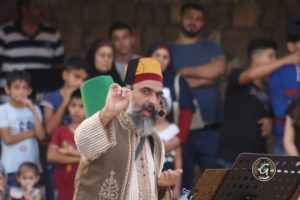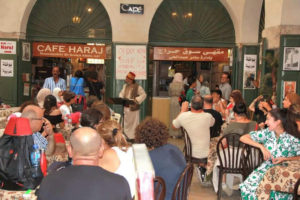Hkeyeh, the traditional Lebanese storytelling

For years now, the social practice of storytelling (from the Arabic verb “ḥakā”, meaning “to tell, to recount, to narrate”) has been facing threats in Lebanon. Traditional storytelling, with its transmission conditions, communication rules, and rituals, which differ from one cultural group to another, is regressing. The number of storytellers (individuals who tell or retell orally transmitted stories) has significantly declined in rural areas. Wakes with traditional non-professional storytellers have become increasingly rare in the Lebanese social landscape, primarily due to forced displacements, rural exodus, and other factors that severe the chain of transmission between generations.

In urban environments, the professional storyteller known as the Ḥakawātī (exclusively male and urban-based), no longer exists in the cafés of Beirut, Tripoli, and Saida, where he used to tell stories. He disappeared completely around 1975-1980, during the civil war. His audience consisted mainly of city dwellers, especially – but not exclusively – during the month of Ramadan. The Ḥakawātī could sometimes be called upon to tell stories at private parties. He was primarily compensated through tips left by café customers or paid a predetermined amount agreed upon with a private individual. Usually seated on a chair, the Ḥakawātī would recount, or more commonly read, the siyars (plural of sirâ, i.e. epic or popular novels) from ancient manuscripts. These tales were centered around adventures or romance, primarily depicting the personal prowess or warlike exploits of their heroes.
In Lebanon, neo-storytelling (“néo-contage”) or neo-orality (“néo-oralité”) – terms that emerged in France with the revival of storytelling – is increasingly becoming a performing art. Storytellers like Jihad Darwish are introducing the younger generation to new haki techniques. These emerging storytellers are professionalizing their craft and attempting to revive the tradition, but their repertoire draws from collections of tales that span different geographical regions. Storytelling sessions are often prompted and sometimes theatricalized: Tales should be told on stage or staged in order to exist.
Several organizations, such as Al-Sabil (Beirut), Cross Arts Association (Tripoli), Maison des arts et du conte (Beirut), and Maison de l’Artiste (Hammana), organize festivals and training courses dedicated to the transmission of storytelling.

